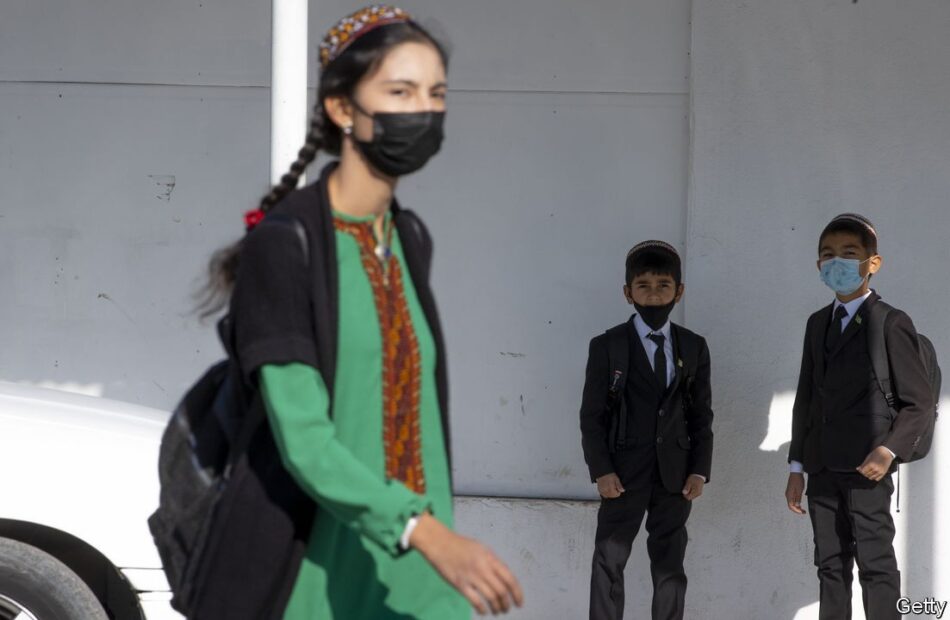Turkmenistan’s new president is clamping down on women’s freedoms
A trip to the beauty salon for a manicure followed by a lift home does not usually constitute an act of subversion. But for women in Turkmenistan such everyday activities are now against the law, subject to fines of up to half the minimum monthly wage. Beauticians who tend to them can be jailed for 15 days.Listen to this story.Enjoy more audio and podcasts on iOS or Android.Your browser does not support the element.Save time by listening to our audio articles as you multitaskThe new rules, imposed last month, are the brainchild of Serdar Berdymukhamedov, Turkmenistan’s new president, who took over from his long-serving father, Gurbanguly, after a rigged election in March. Serdar’s youth—he is only 40 years old—gave rise to tentative hopes among some in the country that he might prove, if not more liberal, at least less repressive than his father. Yet the younger man is turning out to be just as obsessed with micromanaging the lives of his citizens. It is not only manicures that are beyond the pale. Everything from false eyelashes to Botox injections is now restricted. No explanation has been offered, nor any new rules actually published. Law-enforcement officials simply cite an unofficial ban on introducing “foreign objects” to the female body, according to Turkmen.news, a website based in the Netherlands. Women have also been barred from travelling in private vehicles with men to whom they are not related. They can still take taxis—but only so long as they sit in the back seat.Police are enforcing the new rules with relish. They have conducted raids in public places and offices, demanding women remove their face-masks so their lips can be inspected for signs of enhancement. Public-sector employees have had to vow not to dye their hair, use cosmetic procedures or wear tight clothes. On May 14th Radio Liberty, an American-funded media outlet, reported that authorities in the city of Mary were detaining couples, including married ones, for such crimes as holding hands. This is not the Berdymukhamedovs’ first assault on women’s rights. In 2018 Gurbanguly initiated an unofficial campaign against female drivers in which their vehicles were impounded and their licences confiscated on such flimsy grounds as failing to keep all the required gear in the first-aid kits drivers are supposed to carry. Though Turkmenistan is 89% Muslim, most of its people are not very observant and the state is officially secular. The impositions on women derive instead from Turkmen tribal customs called adat, says Akja Kepderi, a Turkmen researcher who goes by a pseudonym to protect her family. Adat dictates that women must stay at home, “serving as a big womb for giving birth to lots of children”, says Ms Kepderi. Rules published last month restrict abortion to the first five weeks of pregnancy, in effect a total ban. The state, which lavishes rewards on women who have eight or more children, presents females as a “reproductive vessel”, says Aynabat Yaylymova of the Progres Foundation, which promotes health literacy. The fertility rate, at 2.7 per woman, has been falling for several decades. Public protests are rare in Turkmenistan. But when they do break out, they are generally led by women, says Ms Kepderi. The most frequent cause is a shortage of food. The older Berdymukhamedov’s prohibition on driving was reportedly eased in 2020 after angry women disrupted the work of driving-licence offices, demanding their applications be accepted. Serdar’s initial moves in office suggest he is likely to be even less female-friendly than his father. Yet in imposing harsh restrictions on half the population, he may be storing up trouble for the future. ■This article appeared in the Asia section of the print edition under the headline “Last chance salon”From the May 21st 2022 editionDiscover stories from this section and more in the list of contents Explore the edition

